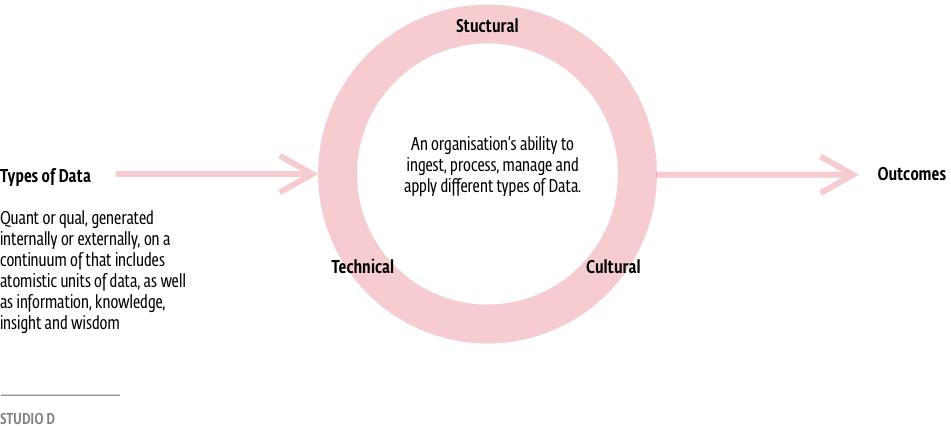Data metabolism is a conceptual framework for thinking about the types of Data that an organisation ingests and acts upon.
The concept is drawn from the Studio D publication Sustainable Data, the uses the analogy of data-as-sustenance for an organisation. In the same way that a person’s food intake impacts their longitudinal health, an organisational data-diet impacts the health of an organisation. It recognises that as much as we understand how fast- and heavily processed foods (and their data equivalents) deliver short-term wants that these aren’t necessary healthy for long term needs.
For example, the condensing of data into an analytics dashboard makes it relatively easy to consume, but the reasoning behind why the dashboard was created and the organisational processes that it led are based on reasons that are not longer relevant or understood.

FIGURE 1. Organisational Data Metabolism
This framework can be used to explore questions such as:
- “how does our organisation’s “Data diet” bias us to certain (often short term) outcomes?”,
- “what is a healthy mix of Data to draw upon for what we are trying to achieve?”, and
- "how can I impact my colleagues decision making."
Whilst these questions might seem relatively straightforward for a given task, the framework recognises that longitudinal investments that organisations make in people and processes can lead calcified choices where practitioners are explicitly and implicitly incentivised to not question the status quo, may not have an adequate understanding of why that status quo came into being, and shy away from more suitable alternatives.
The process of “calcification” includes:
- the inherent nature of the organisation at different stages of its evolution, particularly the shifts that occur as it scales and optimises for efficiency,
- organisational structures, units and reporting lines,
- incentives, rewards and admonishments,
- the language and cultural differences in approaches to Data inherent to business units and teams, and a willingness to step our out comfort zones by engaging with non-traditional types of Data,
- the defensibility of decisions.
The term data can be widely interpreted. In a previous article I make the distinction between lowercase “data” that refers to atomistic units of data — such as a raw, unprocessed data from an app or service, or in the case of qual research the first pass of the interview transcript, an unedited video recording or photo. Alternatively, uppercase “Data” is used to encompass other stages in the evolution of understanding including information, knowledge and insight.
One way of thinking about the differences between qual and quant data is that:
- quant measures the known world i.e. things that are considered “measurable” whereas,
- qual data probes the unknown such as understanding the “why” behind behaviours, reframing assumptions, or generating a list of caveats to that help us more effectively parse analytics.
Whilst quant data is widely engrained across business units, qualitatively sourced data is typically limited to design, product, brand, marketing, communications, human resources, and some user research.
What’s next?
I’m interested how advances in AI and computational processing provide new ways to draw value from Data—the subject of my next book on human and organisational sensemaking.
In the following articles I'll be using the impact of AI on photography as a case study, because it is largely siloed in organisations, but at the same time the sharing of photos can be considered a human universal.
Appreciate you putting the word out.
Foot notes
Studio D has just launched our 2024 masterclass line-up which we’ll run in May, with early bird tickets now available. It includes a new session focussed on Photography in the Paradigm Shift to help sensemaking practitioners navigate the threats and opportunities from AI. It might seem a niche topic, but the lessons learned apply to all types of Data.
//
To stay abreast of what Studio D publishes and finds interesting, join our community of 8,754 of ethically grounded, internationally minded subscribers of our ~monthly Radar mailing list.
//
Photo: street food, Shanghai.
